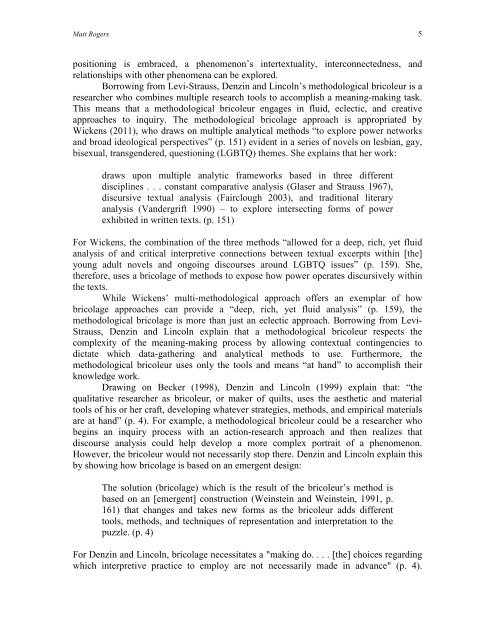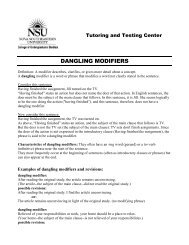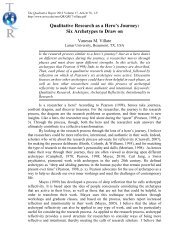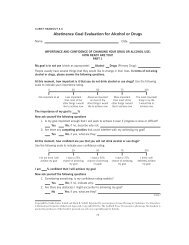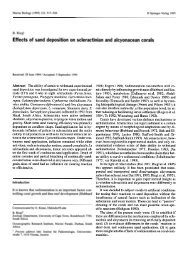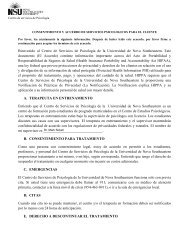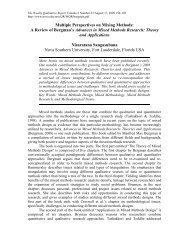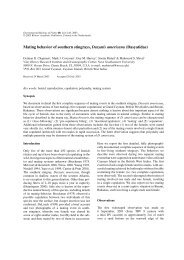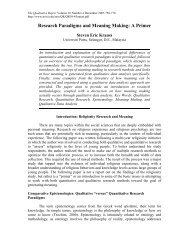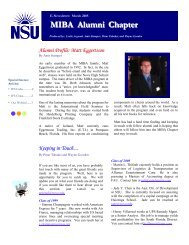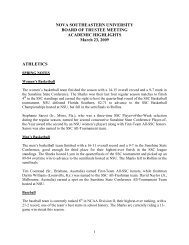Contextualizing Theories and Practices of Bricolage Research
Contextualizing Theories and Practices of Bricolage Research
Contextualizing Theories and Practices of Bricolage Research
Create successful ePaper yourself
Turn your PDF publications into a flip-book with our unique Google optimized e-Paper software.
Matt Rogers 5<br />
positioning is embraced, a phenomenon’s intertextuality, interconnectedness, <strong>and</strong><br />
relationships with other phenomena can be explored.<br />
Borrowing from Levi-Strauss, Denzin <strong>and</strong> Lincoln’s methodological bricoleur is a<br />
researcher who combines multiple research tools to accomplish a meaning-making task.<br />
This means that a methodological bricoleur engages in fluid, eclectic, <strong>and</strong> creative<br />
approaches to inquiry. The methodological bricolage approach is appropriated by<br />
Wickens (2011), who draws on multiple analytical methods “to explore power networks<br />
<strong>and</strong> broad ideological perspectives” (p. 151) evident in a series <strong>of</strong> novels on lesbian, gay,<br />
bisexual, transgendered, questioning (LGBTQ) themes. She explains that her work:<br />
draws upon multiple analytic frameworks based in three different<br />
disciplines . . . constant comparative analysis (Glaser <strong>and</strong> Strauss 1967),<br />
discursive textual analysis (Fairclough 2003), <strong>and</strong> traditional literary<br />
analysis (V<strong>and</strong>ergrift 1990) – to explore intersecting forms <strong>of</strong> power<br />
exhibited in written texts. (p. 151)<br />
For Wickens, the combination <strong>of</strong> the three methods “allowed for a deep, rich, yet fluid<br />
analysis <strong>of</strong> <strong>and</strong> critical interpretive connections between textual excerpts within [the]<br />
young adult novels <strong>and</strong> ongoing discourses around LGBTQ issues” (p. 159). She,<br />
therefore, uses a bricolage <strong>of</strong> methods to expose how power operates discursively within<br />
the texts.<br />
While Wickens’ multi-methodological approach <strong>of</strong>fers an exemplar <strong>of</strong> how<br />
bricolage approaches can provide a “deep, rich, yet fluid analysis” (p. 159), the<br />
methodological bricolage is more than just an eclectic approach. Borrowing from Levi-<br />
Strauss, Denzin <strong>and</strong> Lincoln explain that a methodological bricoleur respects the<br />
complexity <strong>of</strong> the meaning-making process by allowing contextual contingencies to<br />
dictate which data-gathering <strong>and</strong> analytical methods to use. Furthermore, the<br />
methodological bricoleur uses only the tools <strong>and</strong> means “at h<strong>and</strong>” to accomplish their<br />
knowledge work.<br />
Drawing on Becker (1998), Denzin <strong>and</strong> Lincoln (1999) explain that: “the<br />
qualitative researcher as bricoleur, or maker <strong>of</strong> quilts, uses the aesthetic <strong>and</strong> material<br />
tools <strong>of</strong> his or her craft, developing whatever strategies, methods, <strong>and</strong> empirical materials<br />
are at h<strong>and</strong>” (p. 4). For example, a methodological bricoleur could be a researcher who<br />
begins an inquiry process with an action-research approach <strong>and</strong> then realizes that<br />
discourse analysis could help develop a more complex portrait <strong>of</strong> a phenomenon.<br />
However, the bricoleur would not necessarily stop there. Denzin <strong>and</strong> Lincoln explain this<br />
by showing how bricolage is based on an emergent design:<br />
The solution (bricolage) which is the result <strong>of</strong> the bricoleur’s method is<br />
based on an [emergent] construction (Weinstein <strong>and</strong> Weinstein, 1991, p.<br />
161) that changes <strong>and</strong> takes new forms as the bricoleur adds different<br />
tools, methods, <strong>and</strong> techniques <strong>of</strong> representation <strong>and</strong> interpretation to the<br />
puzzle. (p. 4)<br />
For Denzin <strong>and</strong> Lincoln, bricolage necessitates a "making do. . . . [the] choices regarding<br />
which interpretive practice to employ are not necessarily made in advance" (p. 4).


